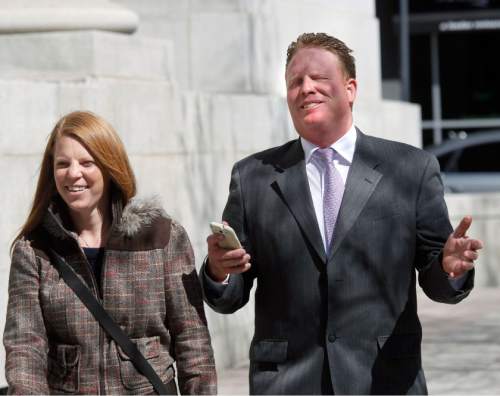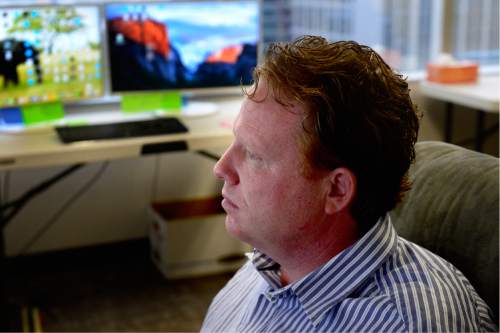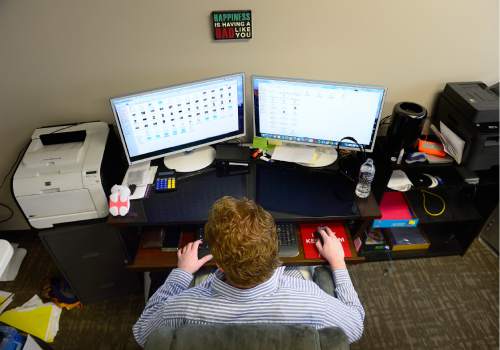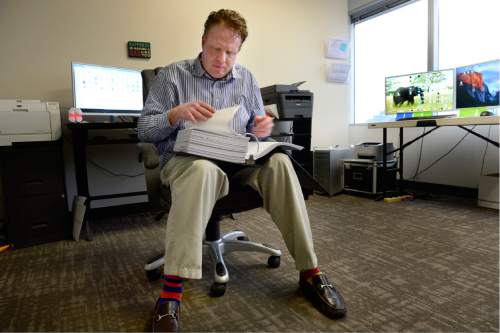This is an archived article that was published on sltrib.com in 2016, and information in the article may be outdated. It is provided only for personal research purposes and may not be reprinted.
A former employee of St. George businessman Jeremy Johnson's online marketing company testified Tuesday she felt uneasy about setting up a series of companies using names of employees and others so the company could continue to charge customers' credit cards.
Tracey Kramm, who said she had been fired in 2010 after about nine months of working at I Works, testified in the federal court trial of Johnson and two former employees that she felt uncomfortable in helping to create what the government alleges was a series of shell corporations. The companies were formed after I Works began to see a large number of credit card chargebacks that led to the closure of some I Works accounts, Kramm said.
Kramm said addresses used for registering new companies and applying for bank accounts were made at UPS and other private mail locations in the states where the companies were incorporated, including Nevada and Delaware. She also picked up mobile phones for each of the companies with a number assigned to them that also corresponded with the area code where they were registered, Kramm said.
"It just seemed wrong to go to all the lengths to create all these companies and all the false information," she told the jury hearing the case in the trial that entered its second week on Tuesday.
Johnson, the owner of I Works, and accountant Scott Leavitt and former General Manager Ryan Riddle are facing 86 charges that include bank fraud allegations related to accounts set up at Wells Fargo Bank using the companies that Kramm testified about.
The defendants say they were acting on advice from Wells Fargo or its agents, that there was no attempt made to conceal Johnson's association with the new corporations and there was no intent to defraud the bank. But U.S. District Judge David Nuffer has prohibited the three from presenting evidence that Wells Fargo did not lose any money by opening new accounts for the I Works-related companies.
Kramm testified said she began looking for work while at I Works but didn't find a new job until some months after she was fired. She was told she had shown she was unhappy at the company and had been complaining to others about it when she was fired, Kramm said.
"I felt like the company was in trouble," Kramm said"It was doing things I thought were unethical."
But on cross-examination by Johnson, who is representing himself in the case, Kramm admitted she had been shocked by her firing and had contemplated a lawsuit against I Works because of it.
She also testified she had called the Federal Trade Commission and the Department of Justice to inform the agencies of what she considered problems with I Works' operations after she was fired.
"Is it fair to say you have a grudge against I Works?" Johnson asked.
"No," Kramm replied.
Riddle, one of Kramm's former bosses who also is representing himself during the trial, got Kramm to admit on cross-examination that CardFlex, the credit card processor working with Wells Fargo, had helped I Works to set up at least some of the bank accounts at issue in the trial.
Shannon Walker, an employee of the Town & Country Bank of St. George, testified that she worked with Leavitt in setting up bank accounts for the companies I Works had created.
Under cross-examination, Walker said she saw nothing improper in the paperwork used to set up the accounts.
"Do you have a sense anyone was trying to conceal from you that they were associated with I Works?" Leavitt's attorney, Marcus Mumford asked.
"No," Walker replied.











